英国文学
英国经典文学作品

英国经典文学作品
英国经典文学作品
英国文学史悠久,产生了众多经典文学作品。
以下是几个著名的英国经典文学作品:
《傲慢与偏见》(Pride and Prejudice)是英国作家简·奥斯汀的代表作,讲述了英国乡绅达西与女主人公伊丽莎白·班纳特的爱情故事。
小说通过对社会阶层、男女关系和婚姻观念的描写,反映了当时英国社会的面貌和价值观念。
其深刻的人物塑造和幽默的叙述方式使得这部小说成为英国文学史上的经典之作。
《双城记》(A Tale of Two Cities)是英国作家查尔斯·狄更斯的代表作之一,讲述了法国大革命时期的故事。
小说通过对人物命运的描写,反映了当时社会的阶级矛盾、政治腐败和人性的复杂性。
其深刻的思想和感人的情节使得这部小说成为英国文学史上的经典之作。
《爱玛》(Emma)是英国作家简·奥斯汀的代表作之一,讲述了女主人公爱玛·伍德豪斯的爱情故事。
小说通过对人物内心感情的描写,反映了当时英国社会的道德观念和人性的复杂性。
其精湛的文笔和深刻的思想使得这部小说成为英国文学史上的经典之作。
《呼啸山庄》(Wuthering Heights)是英国作家艾米莉·勃朗特的代表作,讲述了希斯克利夫与凯瑟琳的爱情故事。
小说通过对人物感情的描写,反映了当时英国社会的阶级矛盾和人性的复杂性。
其独特的叙事方式和深刻的思想使得这部小说成为英国文学史上的经典之作。
以上是几部英国经典文学作品的介绍。
这些作品通过对当时社会、人性和文化的描写,反映了英国文学的历史和文化传统。
英国文学奖项

英国文学奖项
英国的文学奖项有很多,其中包括诺贝尔文学奖、英国布克奖、英国柑橘文学奖、英联邦作家奖、英国独立报外国小说奖、曼布克国际文学奖、科斯塔图书奖、艾略特诗歌奖(英联邦国家诗人的单本诗集)、独立报最佳外国小说等。
其中,诺贝尔文学奖是世界上最高级别的文学奖项之一,设立于1901年,每年颁发给在文学领域做出杰出贡献的作家、诗人或戏剧家。
英国布克奖被认为是当代英语小说界的最高奖项,也是世界文坛上影响最大的文学大奖之一。
以上信息仅供参考,如果您还想了解更多信息,建议查阅相关网站。
英国布克奖(Booker Prize)是英国文学界最著名、最具有国际影响力的文学奖项之一,被誉为“英国诺贝尔文学奖”。
该奖项由英国作家协会于1969年设立,旨在奖励英国及英联邦国家出版的最佳长篇小说,并鼓励优秀文学作品的创作和出版。
布克奖的评选标准非常严格,只考虑单本出版的小说,不考虑系列或者多部作品。
作品必须为英文原创,且必须在本年度首次出版。
评选过程非常保密,评委们会进行多次讨论和投票,最终选出获奖作品。
布克奖的影响力不仅限于英国,而是全球范围内。
许多获奖作品被广泛翻译成多种语言,并在国际上产生了深远的影响。
该奖项也是许多作家追求的荣誉,许多作家都以获得布克奖为荣,因为它代表着对他们的创作才华和文学成就的认可。
除了布克奖之外,英国还有许多其他的文学奖项,如曼布克国际文学奖、科斯塔图书奖、艾略特诗歌奖等。
这些奖项都在不同领域和方面对英国文学做出了贡献,同时也激励着更多的人参与到文学创作中来。
英国文学简史分类

英国文学简史分类一、古英国文学古英国文学是指公元5世纪至公元11世纪之间的英国文学作品。
这一时期的文学作品主要以英国盎格鲁人和撒克逊人的口头传承方式流传下来。
最早的古英国文学作品是口头传承的史诗,如《贝奥武夫》和《西德里克史诗》。
这些作品描绘了英雄壮举和神话传说,展现了古英国人的价值观和文化背景。
二、中世纪文学中世纪文学是指公元11世纪至15世纪之间的英国文学作品。
这一时期的文学作品受到基督教和法国文学的影响,主题涉及爱情、骑士精神和宗教信仰等。
最著名的中世纪文学作品是《亚瑟王传奇》,它描绘了亚瑟王和圆桌骑士的故事,体现了骑士精神和中世纪的价值观。
此外,还有一些宗教戏剧,如《诗篇》和《谢弗尔诗篇》等,用于教育和传播基督教信仰。
三、文艺复兴文学文艺复兴文学是指16世纪至17世纪初期的英国文学作品。
这一时期的文学作品受到古希腊罗马文化的影响,主题多样化,包括诗歌、戏剧、散文等。
著名的文艺复兴文学作品包括莎士比亚的戏剧作品,如《哈姆雷特》和《罗密欧与朱丽叶》,以及约翰·米尔顿的史诗《失乐园》等。
这些作品在文学史上具有重要地位,对后世的文学创作产生了深远影响。
四、启蒙时代文学启蒙时代文学是指18世纪的英国文学作品。
这一时期的文学作品反映了对理性、科学和人权的追求。
著名的启蒙时代作家包括约翰·洛克、伊莱扎·海伍德和亚当·斯密等。
他们的作品涉及政治、哲学和经济等领域,对当时社会产生了重要影响。
其中,洛克的《人类理解论》被认为是启蒙运动的经典之作。
五、浪漫主义文学浪漫主义文学是指19世纪初期的英国文学作品。
这一时期的文学作品强调个人情感、自然景观和想象力。
著名的浪漫主义作家包括威廉·华兹华斯、塞缪尔·泰勒·柯勒律治和乔治·戈登·拜伦等。
他们的作品描绘了自然的壮丽和人类的内心世界,对后世文学产生了深远影响。
其中,华兹华斯的《抒情诗集》被誉为浪漫主义诗歌的代表作品。
英国文学
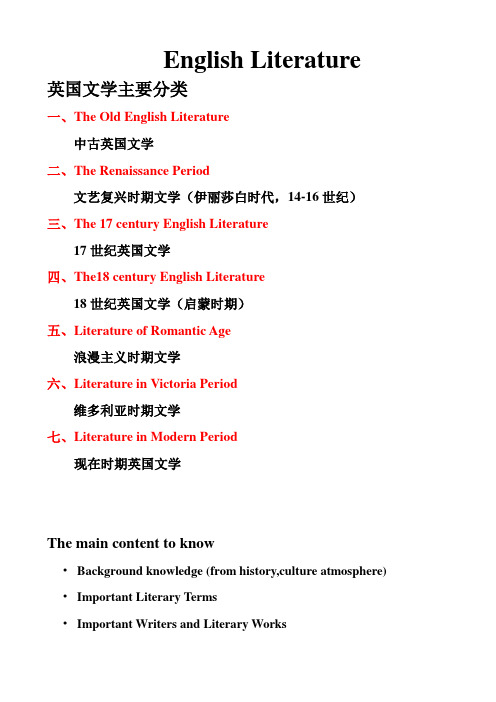
English Literature 英国文学主要分类一、The Old English Literature中古英国文学二、The Renaissance Period文艺复兴时期文学(伊丽莎白时代,14-16世纪)三、The 17 century English Literature17世纪英国文学四、The18 century English Literature18世纪英国文学(启蒙时期)五、Literature of Romantic Age浪漫主义时期文学六、Literature in Victoria Period维多利亚时期文学七、Literature in Modern Period现在时期英国文学The main content to know•Background knowledge (from history,culture atmosphere) •Important Literary Terms•Important Writers and Literary WorksThe Old English Literature(一)General Introduction(总体介绍)The Old English literature(which lasted from 499 to 1066)isexclusively a verse(诗篇)literature in oral form.There were two groups of English poetry in this period-the first was the pagan(异教的)poetry represented by Beowulf,the second was the religious poetry represented by the works of Caedmon and Cynewulf.In the 8th century,Anglo-Saxon prose appeared.The most famous prose writers of that period were Venerable bede and Alfred the Great.After the Norman Conques,three languages existed in England,which were French spoken by the Normans,English spoken by the lower class and Latin spoken by the scholars and clergymen. The prevailing from of literature in the feudal England was the Romance.The Romance prospered for 300 years(1200-1500)from which we see an epitome(缩影)of the Middle Ages.In the 15th century,English ballads became very popular and the only important writer was Thomas Malory.(二)Important Literary TermsOld English(古英语):language spoken by the Anglo-Saxons is called the Old English,which is the foundation of English language and literature.Romance(中世纪的传奇故事):The Romance was the prevailing form of literature in the Middle Ages.It was a long composition, sometimes in verse, sometimes in prose, describing the life and adventures of a noble hero.(三)Important Writers and Literary Works1.Beowulf(《贝奥武甫》)Beowulf is the oldest poem in the English language and the most important spe-cimen of Anglo-Saxon literture.The main stories are based on the folk legends of the primitive northern tribes.2.Religious Poets(宗教诗人)Caedmon(卡德蒙,610-680)Caedmon is the first known religious poet of England.He is known as the father of English song, Caedmon’s Hymn (《卡德蒙的赞美诗》)is a praise poem in honor of god.Cynewulf(基涅武甫,公元九世纪)Cynewulf lived in the 9th century. He produced four poems, of which The Christ(《基督》)is the most characteristic. Throughout the poem, a deep love for Christ and reverence for Virgin Mary(圣母利亚)are expressed.3.Prose Writers(散文作家)Venerable Bede(可敬的比德,672-735)Bede,also referred to as Saint Bede(圣比德)or the Venerable Bede,is well known as an author and scholar,and his most famous work, Historia Ecclesiastica Gentis Anglorum, or An Ecclesiastica History of the English People(《英吉利人教会史》),gained him the title “The Father of English History”(英国史学之父)Alfred the Great(阿尔弗雷德大帝,849-899)Alfred is the only English monarch to be accorded the epithet “the Great”(唯一一个被授予“大帝”名号额英格兰国王).He was the first King of the West Saxons to style himself “King of the Anglo-saxons”(将自己命名为“盎格鲁-撒克逊之王”的西撒克逊国王).The Anglo-Saxon Chronicle(《盎格鲁-撒克逊编年史》)is a collection of annals(年鉴)in Old English chronicling the history of the Anglo-Saxons. original manusript of the Chronicle was created late in the 9th century, probably in Wessex,duing the reign of Alfred the Great.4.The Romance(传奇)Sir Gawain and the Green Knight(《高文爵士与绿衣骑士》)It is a romance of 2,530 lines derived from Celtic legend(凯尔特骑士).Sir Cawain, nephew of King Arthur, accepted the challenge of the Green Knight in the Green Chapel(绿教堂). At last, he got a girdle (腰带)as a gift from the Knight and his story became widely known.5.Age of Chaucer(乔叟时代)The 14th century is called “Age of Chaucer”.Chaucer and Langland(朗格兰,1332-1400,英国诗人),were the most important writers of age.Ceoffrey Chaucer(杰弗里·乔叟,1343-1400)Chaucer is acclaimed not only as “the father of English poetry”(英国诗歌之父),but also as “the father of English fiction (英国小说之父).His masterpiece, The Canterbury Tales(《坎特伯雷故事集》),is one of the most famous works in all literatures.Chaucer wrote in vivid and exact language; his poetry is full vigor and swiftness.Book of the Duchess 《公爵夫人之书》The House of Fame《声誉之宫》The Parliament of Fowls 《百鸟会议》The Legend of Good Women 《贤妇传说》Troilus and Criseyde 《特洛伊罗斯与克丽西达》6. The 15th Century Ballads(民歌,歌谣)Thomas Malory(托马斯·马洛礼,1405-1471)Tomas Malory wrote an important work called Le Morte d’Arthur(《亚瑟王之死》).The central concern is with the adventures of Arthur and his famous Knights of the Round Table(圆桌骑士).The book is very important in English literature.Its Arthurian materials have a strong influence on literature of later centuries.The Renaissance Period伊丽莎白时代,14—16世纪一)General Introduction(总体介绍)The Renaissance(文艺复兴)was a European phenomenon, which originated in Italy. The English Renaissance encouraged the reformation of the Church.In Elizabethan(伊丽莎白)period, English literature developed with great speed. The most distinctive achievement of Elizabethan literature is drama. Next to drama is the lyrical poetry(抒情诗),remarkable for its variety and freshness and romantic feeling.In that period, writing peotry became a fashion and England became “a nest of singing birds”. In tha same period, Francis Bacon wrote more than fifty excellent essays, which make him one of the best essayists(散文家)in English literature.(二)Important Literary Terms1)Renaissance:In the Renaissance Period, scholars began to emphasize the capacities of human mind and the achievements of human culture. So humanism(人文主义)became the keynote of English Renaissance. English Renaissance is divied into three periods:①the 1st period from 1516 to 1578 is called the beginning of the Renaissance.②The 2nd period from1578 to 1625 is known as the flowering period.③The 3rd period from 1625 to 1660 is the epilogue(尾声)of the Renaissance.2) Spenserian Stanza(斯宾塞诗体)Spenser invented a new verse form. Each stanza has nine lines, each of the first eight lines is in iambic pentameter and the ninth line is an iambic hexameter line.(每个诗节由九行组成,前八行为五步抑扬格,第九行为六步抑扬格。
a level英国文学

a level英国文学
A-level 英国文学是英国中学阶段的高级水平考试科目之一。
它涵盖了英国文学的各个不同时期和流派,帮助学生深入了解英国文学的发展和特点。
A-level 英国文学的课程内容通常包括以下几个主要方面:
1. 文学史和文学流派:学生将研究英国文学的主要时期,如文艺复兴时期、启蒙时期、维多利亚时代等,并了解不同时期文学作品的特点和创作风格。
2. 文学分析和解读:学生将学习如何进行文学作品的分析和解读,包括理解作品的主题、情节、角色塑造等,以及理解作者在作品中传达的意图和观点。
3. 文学作品的背景和历史:学生将了解文学作品的背景和历史背景,包括作者的生活和时代背景对作品创作的影响。
4. 文学批评和评论:学生将学习如何进行文学批评和评论,包括对文学作品进行评价和分析,以及理解不同批评流派和观点的比较。
在 A-level 英国文学考试中,学生通常需要阅读和分析一些经典文学作品,包括莎士比亚的戏剧、奥斯汀的小说、雪莱的诗歌等。
此外,学生还需要写论文和文章,展示对文学作品的深刻理解和批评能力。
通过 A-level 英国文学考试,学生可以进一步深入了解英国文学的各个方面,并为进一步学习相关专业如英语文学、文化研究等做准备。
此外,它也可以为学生在大学申请时增加文学方面的学术背景和能力。
英国文学
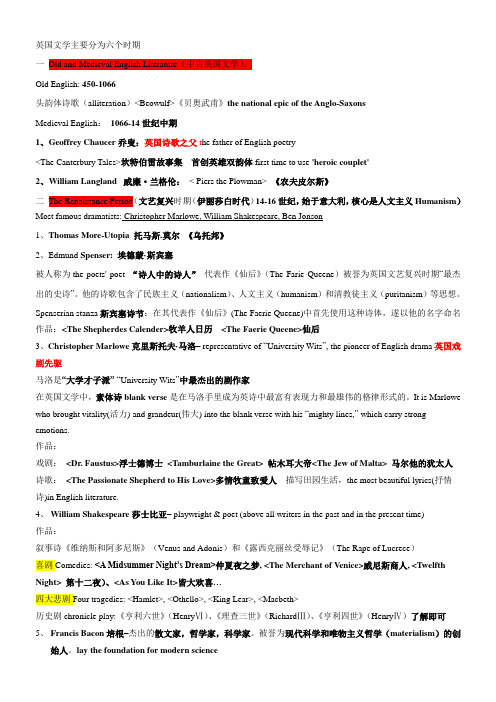
英国文学主要分为六个时期一Old and Medieval English Literature(中古英国文学)。
Old English: 450-1066头韵体诗歌(alliteration)<Beowulf>《贝奥武甫》the national epic of the Anglo-SaxonsMedieval English:1066-14世纪中期1、Geoffrey Chaucer乔叟:英国诗歌之父t he father of English poetry<The Canterbury Tales>坎特伯雷故事集首创英雄双韵体first time to use 'heroic couplet'2、William Langland 威廉·兰格伦:< Piers the Plowman>《农夫皮尔斯》二The Renaissance Period(文艺复兴时期(伊丽莎白时代)14-16世纪,始于意大利,核心是人文主义Humanism)Most famous dramatists: Christopher Marlowe, William Shakespeare, Ben Jonson1、Thomas More-Utopia 托马斯.莫尔《乌托邦》2、Edmund Spenser: 埃德蒙·斯宾塞被人称为the poets' poet “诗人中的诗人”代表作《仙后》(The Farie Queene)被誉为英国文艺复兴时期―最杰出的史诗‖。
他的诗歌包含了民族主义(nationalism)、人文主义(humanism)和清教徒主义(puritanism)等思想。
Spenserian stanza斯宾塞诗节:在其代表作《仙后》(The Faerie Queene)中首先使用这种诗体,遂以他的名字命名作品:<The Shepherdes Calender>牧羊人日历<The Faerie Queene>仙后3、Christopher Marlowe克里斯托夫·马洛– representative of ―University Wits‖, the pioneer of English drama英国戏剧先驱马洛是“大学才子派”―University Wits‖中最杰出的剧作家在英国文学中,素体诗blank verse是在马洛手里成为英诗中最富有表现力和最雄伟的格律形式的。
[英国文学作品]英国文学
![[英国文学作品]英国文学](https://img.taocdn.com/s3/m/d32b940017fc700abb68a98271fe910ef12dae45.png)
[英国文学作品]英国文学英国文学篇(1):10部英国经典小说10. 《名利场》Vanity Fair (William Makepeace Thackeray, 1848)威廉·梅克皮斯·萨克雷,1848年出版这部小说的主角或许就是英国文学史上最知名的非正统派女主角——贝奇·夏普,小说的情节围绕阶级、社会、跻身上流社会以及现代读者听来又熟悉又害怕的金融危机。
《名利场》这些要素全都具备, 讲述那个年代,也讲述着每一个年代。
9. 《科学怪人》Frankenstein (Mary Shelley, 1818)玛莉·雪莱,1818年出版这部先锋作品集科幻和哥特式恐怖于一身,营造了一个难以磨灭的“恶魔”主题,即科学家中的“现代普罗米修斯”,几世纪以来经久不衰。
8. 《大卫·科波菲尔》David Copperfield (Charles Dickens, 1850)查尔斯·狄更斯,1850年出版David Copperfield is populated by some of the most vivid characters ever created. They are as much a part of readers’ world, and their way of thinking about the world, as people they have actually met.《大卫·科波菲尔》人物形象众多,性格鲜活的角色云集。
这些人物角色仿佛是读者所在真实世界的一部分,和读者亲身遇见的人一样,有着相似的世界观。
7. 《呼啸山庄》Wuthering Heights (Emily Bront, 1847)艾米莉·勃朗特,1847年出版《呼啸山庄》“蕴含巨大的心理能量,没有其它书籍能够与之匹敌。
”读者推崇《呼啸山庄》是因为其“层层叠叠的叙述结构”和丰富惊人的想象力,更因为《呼啸山庄》超越了爱情故事本身,展现了我们转瞬即逝的欲望之下“永恒的震撼”。
英国文学 英语专业

英国文学英语专业
英国文学是英语专业中的一个重要分支,主要研究英国的历史、文化、传统以及文学作品。
在英语专业中,学生通常需要阅读和分析大量的英国文学作品,了解不同时期和流派的文学特点,以及英国文化和社会背景对文学作品的影响。
英国文学的学习内容包括莎士比亚、简·奥斯汀、查尔斯·狄更斯等著名作家的作品,以及浪漫主义、维多利亚时代、现代主义等不同时期的文学流派。
学生还需要学习文学理论和分析方法,以便更好地理解文学作品的主题、风格和技巧。
除了英国文学,英语专业还包括语言学、文学批评、文化研究等领域。
学生需要掌握英语语言的基本知识和技能,包括听、说、读、写、译等方面。
同时,学生还需要了解英语国家的文化和社会背景,以及语言和文化的相互作用。
总之,英国文学是英语专业中的一个重要组成部分,通过学习英国文学作品和文学理论,学生可以深入了解英国文化和历史,提高自己的语言和文学素养。
英国文学
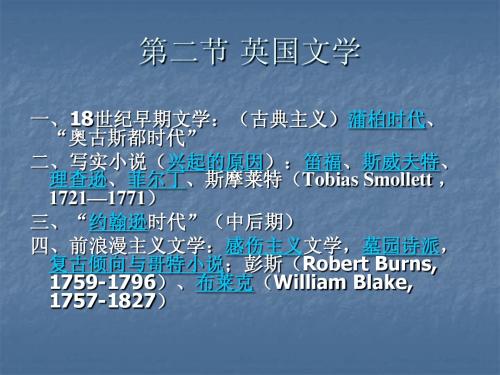
约翰逊时代
约翰逊, 约翰逊,Samuel Johnson, 170917091784 鲍斯威尔, James Boswell, 1740-1795
18世纪英国文坛 世纪英国文坛 盟主,诗人, 盟主,诗人,批评 传记家. 家,传记家.历经 8年之久独自编撰 年之久独自编撰 英文辞典》 了《英文辞典》, 奠定了其声誉.编 奠定了其声誉. 辑《莎士比亚戏剧 集》.晚年代表作 诗人传》 《诗人传》.
小说的兴起
随着现代工商业的发展而产生和壮大起来的中产阶级需要 用一定的文学形式反映他们的观念和要求, 用一定的文学形式反映他们的观念和要求,而小说正生逢 其时地担当了这一重任. 其时地担当了这一重任. 17世纪以来 历史,传记,游记,日记, 世纪以来, 从17世纪以来,历史,传记,游记,日记,人物特写和期 刊文论等散文体裁的发展都为小说提供了有利的文学条件. 刊文论等散文体裁的发展都为小说提供了有利的文学条件. 妇女的参与. 妇女的参与.现代化生产的发展剥夺了妇女原来在家里做 手工或在作坊里劳动的机会,她们大多受过一定教育,是 手工或在作坊里劳动的机会,她们大多受过一定教育, 小说的理想读者. 小说的理想读者. 印刷和出版业的发展. 印刷和出版业的发展.
第二节 英国文学
一,18世纪早期文学:(古典主义)蒲柏时代, 18世纪早期文学:(古典主义 蒲柏时代, 世纪早期文学:(古典主义) 奥古斯都时代" "奥古斯都时代" 写实小说(兴起的原因):笛福,斯威夫特, ):笛福 二,写实小说(兴起的原因):笛福,斯威夫特, 理查逊,菲尔丁,斯摩莱特( 理查逊,菲尔丁,斯摩莱特(Tobias Smollett , 1721—1771) 1721—1771) 约翰逊时代 时代" 中后期) 三,"约翰逊时代"(中后期) 前浪漫主义文学:感伤主义文学 墓园诗派, 文学, 四,前浪漫主义文学:感伤主义文学,墓园诗派, 复古倾向与哥特小说;彭斯( 复古倾向与哥特小说;彭斯(Robert Burns, 1759-1796),布莱克( 1759-1796),布莱克(William Blake, ),布莱克 1757-1827) 1757-1827)
英国文学的作品

英国文学的作品英国文学拥有丰富而悠久的历史,涵盖了各种文体和风格。
以下是一些英国文学中的经典作品,这里列举的仅仅是其中的一小部分,而英国文学中还有很多其他优秀的作品:1. 莎士比亚戏剧:- "哈姆雷特"(Hamlet)- "罗密欧与朱丽叶"(Romeo and Juliet)- "麦克白"(Macbeth)- "奥赛罗"(Othello)2. 经典小说:- "简·爱"(Jane Eyre)- 夏洛蒂·勃朗特(Charlotte Brontë)- "傲慢与偏见"(Pride and Prejudice)- 简·奥斯汀(Jane Austen)- "大卫·科波菲尔"(David Copperfield)- 查尔斯·狄更斯(Charles Dickens)- "汤姆·琼斯的历险"(The History of Tom Jones, a Foundling)- 亨利·菲尔丁(Henry Fielding)3. 诗歌:- "抒情时代"(Lyrical Ballads)- 威廉·华兹华斯(William Wordsworth)和塞缪尔·泰勒·柯勒律治(Samuel Taylor Coleridge)合作- "诗的颂歌"(Songs of Innocence and of Experience)- 威廉·布莱克(William Blake)- "拜伦诗集"(Selected Poems of Lord Byron)- 乔治·戈登·拜伦(Lord Byron)4. 科幻文学:- "时间机器"(The Time Machine)- 威尔斯·赫伯特·乔治·威尔斯(H.G. Wells)- "1984" - 乔治·奥威尔(George Orwell)5. 战争文学:- "战争与和平"(War and Peace)- 列夫·托尔斯泰(Leo Tolstoy)6. 现代文学:- "追风筝的人"(The Kite Runner)- 卡勒德·胡赛尼(Khaled Hosseini)- "哈利·波特"系列- J.K. 罗琳(J.K. Rowling)这仅仅是英国文学中的一些代表性作品,实际上英国文学涵盖了更广泛的时间和主题。
英国文学名著必读

英国文学名著必读
英国文学有着悠久的历史和丰富的遗产,包括了许多经典名著。
以下是一些必读的英国文学名著。
1. 《傲慢与偏见》–简·奥斯汀所著。
这部小说是英国文学的经典之一,讲述了女主角伊丽莎白·班纳特的爱情故事,也是一部关于社会阶层和婚姻制度的戏剧。
2. 《呼啸山庄》–勃朗特姐妹所著。
这部小说描述了两个家族之间的恶意和复仇,以及热情和爱情的力量。
它是一部关于人性和道德的故事,也是一部英国文学中的经典之作。
3. 《雾都孤儿》–查尔斯·狄更斯所著。
这部小说讲述了孤儿奥利弗的冒险故事,以及他在维多利亚时代的贫困生活和社会不公。
它是一部关于社会和人性的故事,也是一部英国文学中的经典之作。
4. 《战争与和平》–列夫·托尔斯泰所著。
这部小说虽然不是英国文学作品,但是它对英国文学有着深刻的影响。
它是一部关于俄罗斯农民战争和拯救祖国的故事,也是一部关于爱情和家庭的故事。
5. 《鲁宾逊漂流记》–丹尼尔·笛福所著。
这部小说讲述了鲁宾逊在荒岛上生存的故事,以及他如何通过自己的聪明才智和勇气克服困难。
它是一部关于人性和
适应力的故事,也是英国文学中的经典之作。
这些作品代表了英国文学的不同流派和主题,从爱情和社会阶层到冒险和人性等各种领域。
无论你是英国文学爱好者还是新手,这些经典必读作品都值得一读。
英国文学名词解释

英国文学名词解释英国文学是指在英国境内产生的文学作品,包括散文、诗歌、戏剧等多种文学形式。
以下是一些与英国文学相关的名词解释:1. 莎士比亚戏剧(Shakespearean Drama):指威廉·莎士比亚所创作的戏剧作品,包括《哈姆雷特》、《罗密欧与朱丽叶》等。
2. 简·奥斯汀小说(Jane Austen Novels):指英国女作家简·奥斯汀所写的一系列小说,主要描写中上层社会的生活,包括《傲慢与偏见》、《理智与情感》等。
3. 浪漫主义(Romanticism):指18世纪末至19世纪初的一种文艺运动,强调情感、个人主义和自然之美,代表作家有威廉·华兹华斯、塞缪尔·柯勒律治等。
4. 维多利亚时期文学(Victorian Literature):指19世纪中后期的英国文学,以女王维多利亚统治时期为背景,作品内容反映了社会变革和道德观念的转变,代表作家有查尔斯·狄更斯、乔治·艾略特等。
5. 符号主义(Symbolism):指19世纪末20世纪初的一种文学流派,强调象征和隐喻的运用,代表作家有奥斯卡·王尔德、D·H·劳伦斯等。
6. 现代主义(Modernism):指20世纪初的一种思潮和文学流派,以对现代社会的批判和对传统形式的挑战为特点,代表作家有弗吉尼亚·伍尔夫、詹姆斯·乔伊斯等。
7. 女性主义文学(Feminist Literature):指关注女性经验和性别平等的文学作品,代表作家有弗吉尼亚·伍尔夫、玛格丽特·阿特伍德等。
8. 后现代主义(Postmodernism):指二战后出现的一种思潮和文学流派,强调对现实的怀疑和对语言的游戏性,代表作家有萨缪尔·贝克特、艾里奥·卡尔维诺等。
9. 科幻文学(Science Fiction):指描写未来社会和科技发展的文学作品,代表作家有霍华德·菲利普斯·洛夫克拉夫特、艾萨克·阿西莫夫等。
英国文学知识简单整理
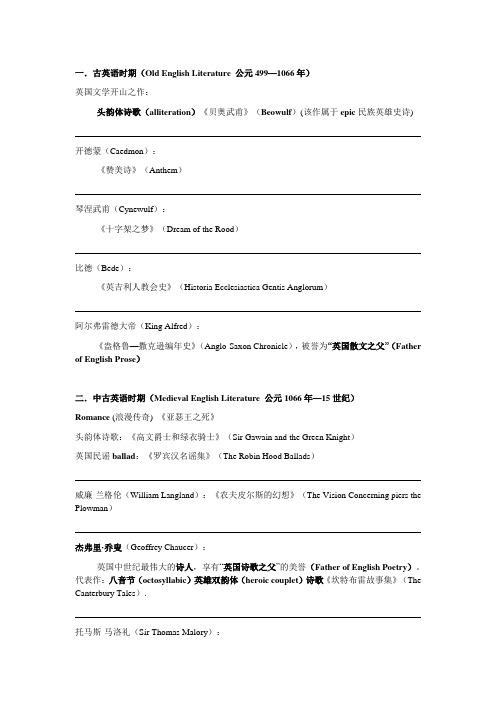
一.古英语时期(Old English Literature 公元499—1066年)英国文学开山之作:头韵体诗歌(alliteration)《贝奥武甫》(Beowulf)(该作属于epic民族英雄史诗)开德蒙(Caedmon):《赞美诗》(Anthem)琴涅武甫(Cynewulf):《十字架之梦》(Dream of the Rood)比德(Bede):《英吉利人教会史》(Historia Ecclesiastica Gentis Anglorum)阿尔弗雷德大帝(King Alfred):《盎格鲁—撒克逊编年史》(Anglo-Saxon Chronicle),被誉为“英国散文之父”(Father of English Prose)二.中古英语时期(Medieval English Literature 公元1066年—15世纪)Romance (浪漫传奇) 《亚瑟王之死》头韵体诗歌:《高文爵士和绿衣骑士》(Sir Gawain and the Green Knight)英国民谣ballad:《罗宾汉名谣集》(The Robin Hood Ballads)威廉·兰格伦(William Langland):《农夫皮尔斯的幻想》(The Vision Concerning piers the Plowman)杰弗里·乔叟(Geoffrey Chaucer):英国中世纪最伟大的诗人,享有“英国诗歌之父”的美誉(Father of English Poetry)。
代表作:八音节(octosyllabic)英雄双韵体(heroic couplet)诗歌《坎特布雷故事集》(The Canterbury Tales).托马斯·马洛礼(Sir Thomas Malory):英国15世纪优秀的散文家,代表作为《亚瑟王之死》(Le Morte d’Arthur)三.文艺复兴时期(Renaissance 15世纪末—17世纪)托马斯·莫尔(Thomas More):伟大的人文主义者,代表作:《乌托邦》(Utopia),《国王爱德华五世悲戚的一生》(The painful Life of Edward Ⅴ).托马斯·魏厄特(Thomas Wyatt)和亨利·霍华德(Henry Howard)的十四行诗(Sonnet).前者将意大利十四行诗引入英国;后者在此基础上,发展了英国十四行诗歌。
《英国文学简介》课件

3
文艺复兴时期文学
莎士比亚的戏剧和斯宾塞的史诗,代表了英国文艺复兴时期的顶峰成就。
18世纪文学
启蒙时代文学
以强调理性和人权为特点,代表作品包括斯威夫特 的《格列佛游记》。
浪漫主义文学
通过追求自然、个人情感和幻想,让艺术与内心相 互融合,如拜伦的诗歌作品。
罗曼主义文学
文学流派 诗歌 小说 戏剧
代表作家 威廉·华兹华斯、塞缪尔·柯勒律治 简·奥斯汀、勃朗特姐妹 威廉·莎士比亚
现代主义文学
特征
反叙述、流派混合、内心意识流的表达方式,如弗 吉尼亚·伍尔夫的《到灯塔去》。
代表作家
T.S.艾略特、詹姆斯·乔伊斯、维吉妮亚·伍尔夫。
当代文学
文学派别
后现代主义、魔幻现实主义、 女性文学、后殖民文学等。
重要作家
伊恩·麦克尤恩、朱利安·巴恩 斯、萨尔曼·鲁西迪。
全球影响
当代英国文学作品在全球范 围内受到广泛关注,引领潮 流并触及世界共同话题。
《英国文学简介》
本PPT课件将带领大家一起探索英国文学的丰富历史和重要作家,以及各个时 期的文学流派和风格。
英国rse
英国文学拥有丰富多样的作品,从古代到现代,涵盖了各种题材和风格。
2 Influential and Enduring
英国文学对世界文学产生了深远的影响,作品在多个国家和文化中广为传播与研究。
3 Reflecting Society
英国文学作品引人深思,反映了当时社会的价值观、文化特征和历史背景。
英国文学史
1
古英语文学
从盎格鲁-撒克逊时期的《贝奥武夫》到中世纪的传说故事,古英语文学充满古 老而神秘的魅力。
2
中世纪文学
英国文学试题及答案

英国文学试题及答案一、选择题(每题2分,共20分)1. 英国文学史上第一位伟大的诗人是:A. 威廉·莎士比亚B. 乔叟C. 约翰·弥尔顿D. 托马斯·哈代2. 以下哪部作品是乔治·奥威尔所著?A. 《1984》B. 《简·爱》C. 《傲慢与偏见》D. 《呼啸山庄》3. 被称为“英国文学之父”的是:A. 约翰·多恩B. 亚历山大·波普C. 威廉·华兹华斯D. 乔叟4. 以下哪位作家是维多利亚时代的代表人物?A. 威廉·布莱克B. 查尔斯·狄更斯C. 托马斯·哈代D. 约翰·弥尔顿5. 英国浪漫主义文学的代表人物包括以下哪些?A. 威廉·华兹华斯和塞缪尔·泰勒·柯勒律治B. 威廉·莎士比亚和本·琼森C. 托马斯·哈代和乔治·艾略特D. 奥斯卡·王尔德和罗伯特·布朗宁二、填空题(每题2分,共10分)6. 威廉·莎士比亚的戏剧作品分为______、______和历史剧。
7. 《鲁滨逊漂流记》的作者是______。
8. 英国现代主义文学的代表人物之一是弗吉尼亚·______。
9. 《简·爱》的作者是______。
10. 《傲慢与偏见》的作者是简·奥斯汀,这部小说属于______文学。
三、简答题(每题10分,共20分)11. 简述威廉·莎士比亚的四大悲剧及其主要特点。
12. 描述查尔斯·狄更斯的写作风格及其对社会的影响。
四、论述题(每题25分,共50分)13. 论述托马斯·哈代的自然主义在《德伯家的苔丝》中的体现。
14. 分析《1984》中乔治·奥威尔对极权主义社会的批判。
答案一、选择题1. B2. A3. D4. B5. A二、填空题6. 喜剧、悲剧7. 丹尼尔·笛福8. 伍尔夫9. 夏洛蒂·勃朗特10. 现实主义三、简答题11. 威廉·莎士比亚的四大悲剧包括《哈姆雷特》、《奥赛罗》、《李尔王》和《麦克白》。
英国文学知识
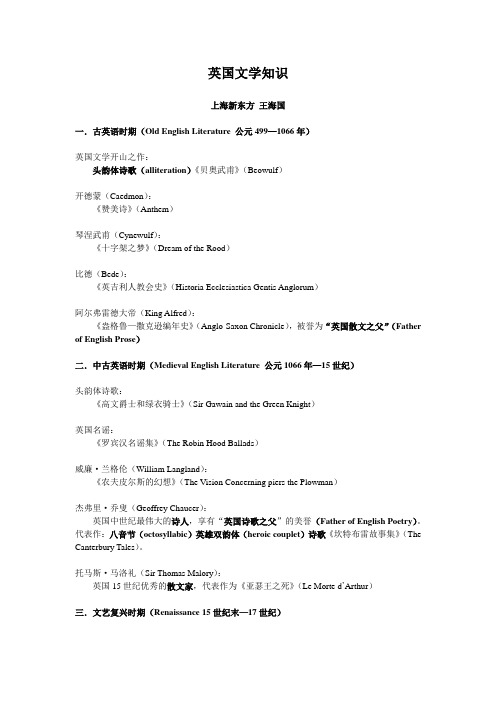
英国文学知识上海新东方王海国一.古英语时期(Old English Literature 公元499—1066年)英国文学开山之作:头韵体诗歌(alliteration)《贝奥武甫》(Beowulf)开德蒙(Caedmon):《赞美诗》(Anthem)琴涅武甫(Cynewulf):《十字架之梦》(Dream of the Rood)比德(Bede):《英吉利人教会史》(Historia Ecclesiastica Gentis Anglorum)阿尔弗雷德大帝(King Alfred):《盎格鲁—撒克逊编年史》(Anglo-Saxon Chronicle),被誉为“英国散文之父”(Father of English Prose)二.中古英语时期(Medieval English Literature 公元1066年—15世纪)头韵体诗歌:《高文爵士和绿衣骑士》(Sir Gawain and the Green Knight)英国名谣:《罗宾汉名谣集》(The Robin Hood Ballads)威廉·兰格伦(William Langland):《农夫皮尔斯的幻想》(The Vision Concerning piers the Plowman)杰弗里·乔叟(Geoffrey Chaucer):英国中世纪最伟大的诗人,享有“英国诗歌之父”的美誉(Father of English Poetry)。
代表作:八音节(octosyllabic)英雄双韵体(heroic couplet)诗歌《坎特布雷故事集》(The Canterbury Tales)。
托马斯·马洛礼(Sir Thomas Malory):英国15世纪优秀的散文家,代表作为《亚瑟王之死》(Le Morte d’Arthur)三.文艺复兴时期(Renaissance 15世纪末—17世纪)托马斯·莫尔(Thomas More):伟大的人文主义者,代表作:《乌托邦》(Utopia),《国王爱德华五世悲戚的一生》(The painful Life of Edwar d Ⅴ).托马斯·魏厄特(Thomas Wyatt)和亨利·霍华德(Henry Howard)的十四行诗(Sonnet)。
英国文学的发展和特点分析
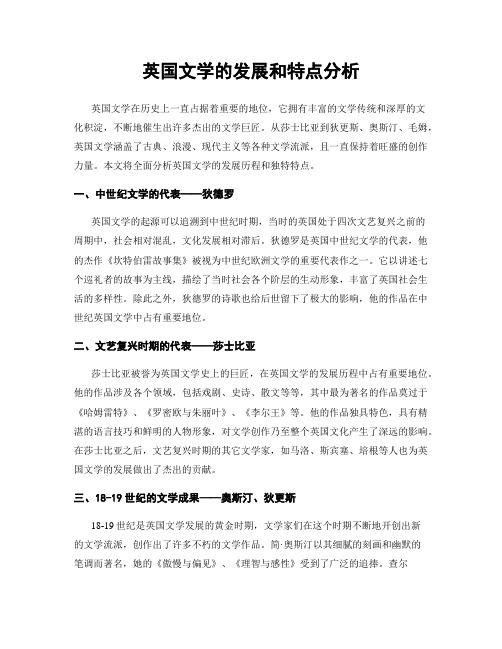
英国文学的发展和特点分析英国文学在历史上一直占据着重要的地位,它拥有丰富的文学传统和深厚的文化积淀,不断地催生出许多杰出的文学巨匠。
从莎士比亚到狄更斯、奥斯汀、毛姆,英国文学涵盖了古典、浪漫、现代主义等各种文学流派,且一直保持着旺盛的创作力量。
本文将全面分析英国文学的发展历程和独特特点。
一、中世纪文学的代表——狄德罗英国文学的起源可以追溯到中世纪时期,当时的英国处于四次文艺复兴之前的周期中,社会相对混乱,文化发展相对滞后。
狄德罗是英国中世纪文学的代表,他的杰作《坎特伯雷故事集》被视为中世纪欧洲文学的重要代表作之一。
它以讲述七个巡礼者的故事为主线,描绘了当时社会各个阶层的生动形象,丰富了英国社会生活的多样性。
除此之外,狄德罗的诗歌也给后世留下了极大的影响,他的作品在中世纪英国文学中占有重要地位。
二、文艺复兴时期的代表——莎士比亚莎士比亚被誉为英国文学史上的巨匠,在英国文学的发展历程中占有重要地位。
他的作品涉及各个领域,包括戏剧、史诗、散文等等,其中最为著名的作品莫过于《哈姆雷特》、《罗密欧与朱丽叶》、《李尔王》等。
他的作品独具特色,具有精湛的语言技巧和鲜明的人物形象,对文学创作乃至整个英国文化产生了深远的影响。
在莎士比亚之后,文艺复兴时期的其它文学家,如马洛、斯宾塞、培根等人也为英国文学的发展做出了杰出的贡献。
三、18-19世纪的文学成果——奥斯汀、狄更斯18-19世纪是英国文学发展的黄金时期,文学家们在这个时期不断地开创出新的文学流派,创作出了许多不朽的文学作品。
简·奥斯汀以其细腻的刻画和幽默的笔调而著名,她的《傲慢与偏见》、《理智与感性》受到了广泛的追捧。
查尔斯·狄更斯则以其对于贫穷阶层及其社会真相的关注而著名,他的《雾都孤儿》、《双城记》等作品更是展现了当时英国社会的面貌,反映了社会的不公和黑暗面。
四、现代主义文学——毛姆20世纪初,英国文学开始进入现代主义文学的时期。
毛姆是英国现代主义文学的代表性人物之一,他的作品《月亮与六便士》、《人性之善谈》等著作探讨了人性、社会及道德的种种问题。
英国文学课程

英国文学课程通常涵盖了从古代到现代的英国文学历史,包括各种文学流派、作家和他们的作品。
课程内容通常包括以下几个方面:文学理论:介绍不同的文学理论,如形式主义、新批评主义、结构主义、后结构主义、女性主义、后殖民主义等,以及它们如何应用于文学作品的解读和分析。
文学作品:介绍和分析各种类型的文学作品,如诗歌、小说、戏剧、散文等。
这些作品通常包括古典文学作品(如乔叟、莎士比亚、蒲柏等)和现代文学作品(如贝克特、奥威尔、品特等)。
文学背景:介绍文学作品产生的历史背景、文化背景和社会背景。
这包括英国的历史、文化、社会风俗等方面的知识。
文学批评:介绍和分析文学批评的方法和技巧,以及如何对文学作品进行深入的分析和理解。
这包括文本细读、主题分析、人物塑造等方面的知识和技能。
文学与文化:介绍文学作品如何反映和塑造文化和社会观念。
这包括文学与性别、阶级、种族等方面的关系,以及文学作品如何影响和被文化和社会观念影响。
英国文学课程通常采用多种教学方法,如讲座、讨论、小组讨论、写作练习等,以帮助学生深入理解文学作品和文学理论,提高他们的阅读理解能力、批判性思维能力和写作能力。
《英国文学选读》课件

通过阅读英国文学作品,可以培 养个人的审美观念、批判思维和
创造力,提升个人综合素质。
英国文学作品中所描绘的人物形 象和故事情节,有助于引导个人 树立正确的价值观、人生观和世
界观。
对社会观念的反思
英国文学作品反映了社会历史的变迁 和人类文明的进步,促使人们对社会 问题进行深入反思。
英国文学作品中对社会问题的揭示和 批判,有助于激发人们对社会正义和 进步的思考,推动社会变革和进步。
,关注其思想内涵和人文精 神,了解当时的社会变革和
文化思潮。
总结词
注重作品的文学技巧和创新
详细描述
探讨中期文学作品所运用的文学技巧和创 新,如何推动文学的发展,以及在文学史 上的贡献。
总结词
关注作品的情感表达和审美追求
详细描述
分析中期文学作品中的情感表达和审美追 求,如何通过情感和审美来表达作品的主 题和思想。
英国文学的价值
英国文学不仅是文化遗产,也是人类智慧的结晶。它提供了对人性、社会和人 类命运的深刻洞察,启发了人们对生活、道德和人性的思考。英国文学作品还 具有很高的审美价值,为读者提供了丰富的阅读体验。
分析当前英国文学的发展趋势
多元化与包容性
当前英国文学的一个显著趋势是 多元化和包容性。越来越多的作 家来自不同背景,关注各种社会 议题,使英国文学更加丰富多彩
03
社会责任与担当
面对当今世界的挑战,未来的英国文学将更加注重社会责任和担当。作
家们将通过他们的作品关注环境保护、社会公正和人权等议题,发挥文
学在社会问题上的舆论引导和思考启迪的作用。
THANKS
感谢观看
通过阅读英国文学作品,可以了解不 同社会背景和文化传统下人们的思想 观念和行为方式,促进跨文化交流和 理解。
- 1、下载文档前请自行甄别文档内容的完整性,平台不提供额外的编辑、内容补充、找答案等附加服务。
- 2、"仅部分预览"的文档,不可在线预览部分如存在完整性等问题,可反馈申请退款(可完整预览的文档不适用该条件!)。
- 3、如文档侵犯您的权益,请联系客服反馈,我们会尽快为您处理(人工客服工作时间:9:00-18:30)。
1.a 2. d 3.c 4. a 5.b
Part III Geoffrey Chaucer
I. Fill in the following blanks.
1. “The Canterbury Tales” contains in fact a general Prologue and only _______ tales, of which two are left unfinished.
2. The literature of the Anglo-Saxon period falls naturally into two divisions, and christian.
3. Among the early Anglo-Saxon poets we may mention _____ , who wrote a poetic “Paraphrase” of the Bible, and Cynewulf.
a. French b. Latin
c. romance d. science
4. The story of “ ” is the culmination of the Arthurian romances.
a. Sir Gawain and the Green Knight
4. Chaucer’s earliest work of any length is his “ ”, a translation of the French “Roman de la Rose” by Gaillaume de Lorris and Jean de Meung, which was a love allegory enjoying widespread popularity in the 13th and 14th centuries not only in France but throughout Europe.
2. In the 14th century, the two most important writers are _____ and _____.
3. Today Chaucer is acclaimed not only as “the father of English poetry” but also as “the father of English fiction”. His masterpiece is .
c. Italy d. Westminster Abbey
3. was the first to be buried in the Poet’s Corner of Westminster Abbey.
a. Chaucer b. Keats
c. Southey d. Tennyson
2. In the 14th century, the most important writer is .
a. Langland b. Wyclif
c. Gower d. Chaucer
3. The prevailing form of Medieval English literature is the .
c. romantic d. sentimental
Part one
1. Jutes 2. Pagan 3. Caedmon 4. The Song of Beowulf
1.d 2.c 3.a
I. Fill in the following blanks.
1. In the year 1066, the Normans defeated the Anglo-Saxons at the battle of .
2. The provides a framework for the tales in “The Canterbury Tales”, and it comprises a group of vivid pictures of various medieval figures.
3. “The Canterbury Tales” is Chaucer’s greatest work and written for the greater part in couplets.
6. The pilgrims in “The Canterbury Tales” are on their way to the shrine of St. Thomas a Becket at a place named .
7. Chaucer’s work “ ” gives us a picture of the condition of English life of his day, such as its work and play, its deeds and dreams, its fun and sympathy.
A. heroic couplet B. quatrain
C. Spenserian stanza D. terza rima
Part two
1. Hastings 2. Chaucer 3. The Canterbury Tales 4. ballads
a. John Donne b. George Herbert
c. Caedmon d. Milton
3. In Anglo-Saxon period, “Beowulf” represented the _______ poetry.
a. pagan b. religious
5. “The Canterbury Tales” opens with a general Prologue where we are told of a company of pilgrims that gathered at Inn in Southwark, a suburb of London.
1. In 1066, led the Norman army to invade and defeat English.
a. William the Conqueror b. Julius Caesar
c. Alfred the Great d. Claudius
4. The fifteen century has been traditionally described as the barren age in English literature. But it is the spring tide of English .
II. Choose the best answer for each statement.
a. Romance of the Rose b. A Red, Red Rose
c. Piers the plowman d. Troilus and Criseyde
5. The second period of Chaucer’s literary career includes mainly the three longer poems written prior to “The Canterbury Tales”. Choose the three from the following.
a. William Shakespeare b. Beowulf
c. Julius Caesar D. Venerable Bede
2. is the first important religious poet in English literature.
II. From a, b, c, or d, choose the best one to complete each statement.
1. the “father of English poetry” and one of the greatest narrative poets of England, was born in London about 1340.
Part I The Anglo-Saxon Period
I. Fill in the following blanks.
1. Angles, Saxons and usually known as Anglo-Saxons are the first Englishmen. Language spoken by them is called the Old English, which is the foundation of English language and literature.
4. The name of the “jolly innkeeper” in “The Canterbury Tales” is , who proposes that each pilgrim of the 32 should tell two tales on the way to Canterbury and two more on the way back.
A. The Song of Beowulf
B. The Ecclesiastical History of the English People
C. Apollonius of Tyre
D. The Anglo-Saxon Chronicles
6. In English poetry, a four-line stanza is called ___.
1. When we speak of the old English prose, the first name that comes into our minds is , who is the first scholar in English literature and has been regarded as father of English learning.
